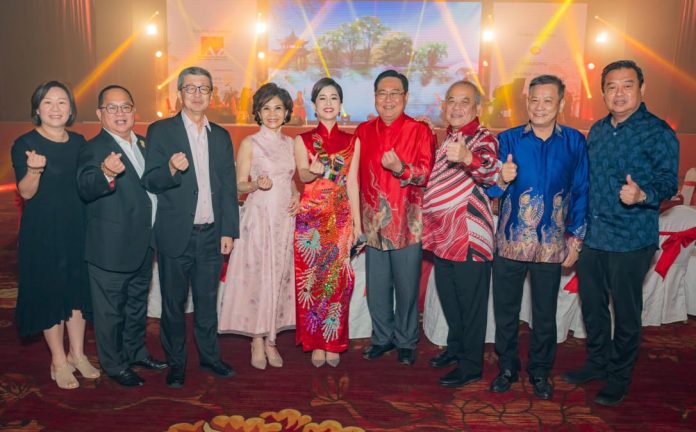SERDANG: Although the Cabinet has deliberated on the issue of “beer company sponsorship for Chinese schools fundraising campaigns” and the Ministry of Education (MOE) too has officially stated its position of “maintaining the existing fundraising guidelines allowing multi-stream schools to receive donations,” it nonetheless still lacks clarity, said Tan Sri T.C. Goh, President of The Federation of Chinese Associations Malaysia (Huazong).
He contended that regardless of whether the controversy occurred during the previous or current government, due to the fact that there is ambiguity in the guidelines concerning the non-Muslims and the Chinese schools, it is necessary for the relevant authorities to further clarify the said guidelines.
“We acknowledge and support the MOE’s statement stating that ‘the Cabinet has taken into consideration the method of multi-stream schools receiving donations through their boards and foundations, a practice that has been implemented by previous governments without any disputes from any party.’ However, it is important to emphasise that since a controversy has arisen this time, the MOE should add clearer terms to the guidelines (e.g., ‘not applicable to non-Muslim or Chinese schools’) while maintaining the status quo to avoid unnecessary disputes in the future,” he said.
Goh, who is also the President of the Federation of Chinese Associations Sabah (FCAS), expressed this in a press release today, after officiating the Alzheimer’s Disease Charity Fundraising Dinner hosted by the Alzheimer’s Disease Foundation Malaysia (ADFM) and co-organised by Huazong at the Yeoh Tiong Lay Auditorium in Wisma Huazong.
Also present on the occasion were the Foundation’s Chairman, Dato’ Jeffrey Ng Chin Heng, Tan Sri Lim Hock San, President of The Federation of Hokkien Associations Malaysia (FHAM), its Secretary-General, Dato’ Wira Lim Chin Lee, President of The Malaysia Wu Clan Association, Datuk Goh Ah Lek, and Dr. Richard Ng, President of the Huang Clan Association of Malaysia, among others.
The invited guests were also entertained by Penang-hailed singer aka “Malaysia’s Teresa Teng,” AiJia, who performed several of Teresa Teng’s evergreen songs.
Goh acknowledged that the recent controversy over a certain beer company sponsoring Chinese school fundraising campaigns has greatly upset the Chinese community.
He stated that fundraising campaigns, whether they are in aid of education, including Chinese schools and education, or for charitable purposes, such as the one for the Alzheimer’s charity fund, should receive government support and assistance in all aspects, especially since they were organised by the community.
He thus hoped that political and community leaders from all ethnic groups could adopt a more open-minded, understanding, moderate, and supportive attitude so as to better demonstrate Malaysia’s multicultural, civilised, and progressive society.
On another note, Goh acknowledged that, established over 20 years ago by the Rotary Club of Shah Alam, the ADFM is a non-profit, independent organisation that has played a vital and indispensable role over the years.
“We fully acknowledge and support the foundation’s goals, objectives, and clear actions, including promoting awareness and education on Alzheimer’s disease across all levels of society, on its early detection and prevention, providing necessary guidance and training for families and carers, and supporting its research and developments,” he said.
He continued that the goal of hosting the “Alzheimer’s Charity Fundraising Dinner” is aimed chiefly to raise funds to support the foundation’s daycare centre operations, including providing care for patients and improving their cognitive functions and quality of life, besides funding repairs, upgrades, renovations, and improvements of the facility.
He thus called on the public, including the Chinese community, to actively respond and support this charitable initiative.
According to the foundation’s data, Malaysia had between 204,000 and 264,000 adults with dementia in 2020, and this number is expected to rise to between 637,500 and 825,000 by 2050.
“Another phenomenon faced by the world today, including Malaysia, is the ageing population. This means the costs associated with handling Alzheimer’s disease and dementia will be higher, and it warrants urgent attention of governments throughout the world,” he said.
He thus hopes the government will continue to recognise and support the development of the Alzheimer’s Disease Foundation, including continuing to provide tax exemptions for donations and annual grants to support its operations and development in various fields, towards building a caring society.
“Let us all contribute to this meaningful public education, social charity, and welfare programme and to jointly build a caring society,” he urged.


